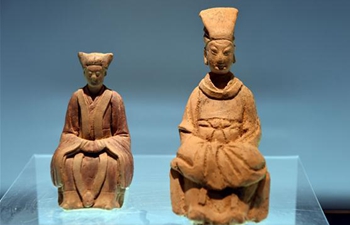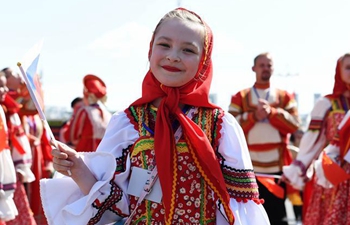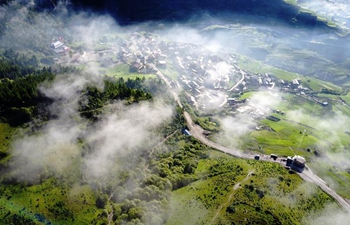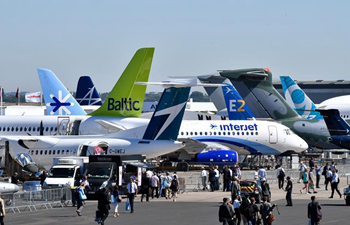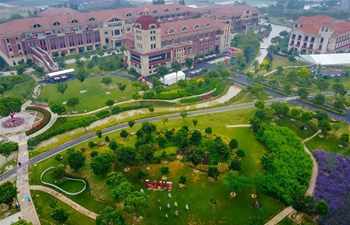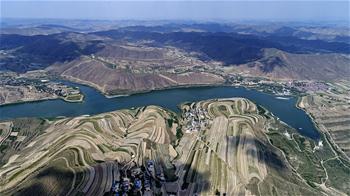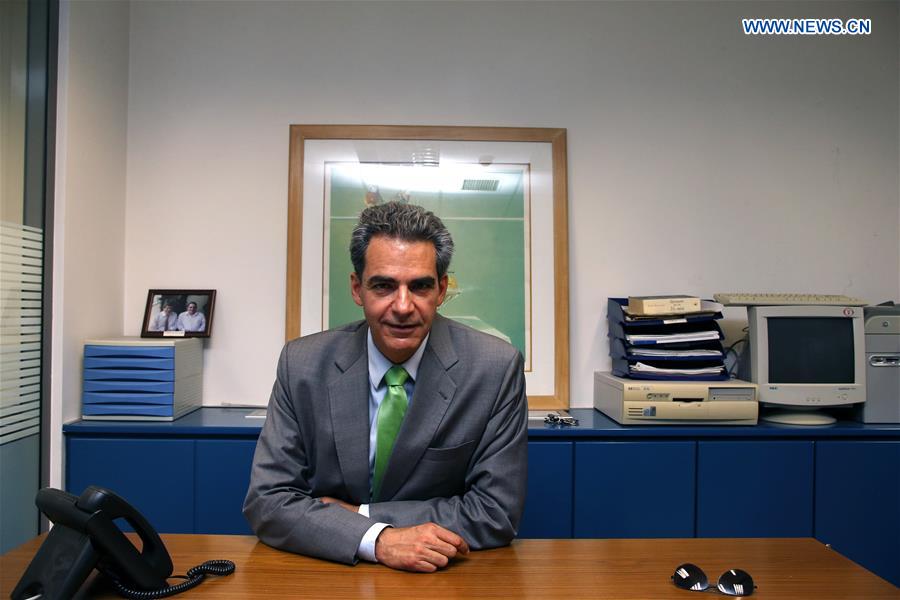
Angelos Syrigos, Associate Professor of International Law and Foreign Policy at the Athens Panteion University, is interviewed with Xinhua in Athens, capital of Greece, on June 15, 2017. Two years into the refugee crisis which tested Europe's limits, paradoxes of the EU policy towards refugees still lie at the root of the crisis, a prominent Greek expert told Xinhua in a recent interview in Athens, urging for swift changes in the EU's common approach to effectively deal with the problems. (Xinhua/Marios Lolos)
By Maria Spiliopoulou
ATHENS, June 22 (Xinhua) -- Two years into the refugee crisis which tested Europe's limits, paradoxes of the EU policy towards refugees still lie at the root of the crisis, a prominent Greek expert told Xinhua in a recent interview in Athens, urging for swift changes in the EU's common approach to effectively deal with the problems.
Angelos Syrigos, Associate Professor of International Law and Foreign Policy at the Athens Panteion University, served as Secretary General of Population and Social Cohesion of the Greek Ministry of Interior from 2012 until the start of the mass flows of refugees and migrants into Greece in 2015. He has a deep knowledge of the issues as a scholar and on the ground.
The refugee crisis caught Europe unprepared and despite measures taken to tackle the problems, shortages in the common EU policy seem to undermine efforts.
"On the root of the problem, there are many paradoxes of the EU policy towards the refugees. That means if you are a refugee and you reside in South Sudan or Darfur, you cannot arrive legally in the EU. But if you manage to enter illegally in the EU and you declare that you are a refugee then you are offered asylum.
"So indirectly the EU invites people to cross illegally the borders in order to become legally refugees. That is one of the paradoxes," Syrigos said.
The Greek expert referred to a long list of such paradoxes, including EU's failure to assist refugees once they flee to areas close to their homes, long before the flows reach Europe.
"The war in Syria started in 2011. Between 2011 and 2015 the amount of money that the EU or the EU states offered to the area was equal to one bottle of drinking water per day per person. So it was totally inadequate," Syrigos noted.
Wrong messages sent from Greece and other EU countries exacerbated the problems in the first few months, according to the professor.
The Greek government which had a very friendly approach to migrants and refugees passed the first wrong message that people are welcome to Greece as long as they continue their journey to other countries, Syrigos explained.
The second wrong message came from the German government in August 2015 when they said "we expect to have a large number of migrants and refugees coming to Germany", he added.
As a result, more and more people started approaching Turkey's Aegean coasts to reach Europe. More than one million people passed through Greece in two years, while thousands perished in the Aegean Sea.
"After August 2015, the Greek government changed its policy and since then they are trying to fight with the problem, not necessarily successfully. There are many problems to do with the housing of the people, with the facilities that are on the islands in order to accommodate these people and their needs," Syrigos said.
More than 60,000 people have been stranded in Greece since the closure of the Balkan route to central Europe in February 2016.
So far EU's main instrument for dealing with the crisis was the March 18, 2016 declaration between the EU and Turkey to jointly stop the mass influx to Europe in exchange of funds to improve living conditions in refugee camps in Turkey.
Despite shortcomings, the deal has produced results, Syrigos noted, adding that for the future much depends on the relations between Ankara and EU states.
The Greek professor also pointed to the slow pace in the implementation of the EU relocation program launched in autumn 2015.
"For the first few months we had the relocation of some 40 people per month. Now it goes faster, but needs improvement and there is a further problem. In practice it works as a beauty contest. That means I ask the most capable, the most educated people to come to my country, I don't want uneducated people with many children etc," he said.
"The general image is it improves, but we still need better performances. It was supposed to last for two years. If it continues like this, it will last for at least another 5-6 years," he stressed.
For Syrigos, the situation is manageable, as long as the number of refugees who arrive in Europe is limited. Otherwise more issues rise. The way EU states dealt until today with the refugee-migration issue has affected the political landscape. The rise of the far-right in Greece and Austria are two of the best examples of this side effect, the Greek expert noted.
In the last presidential elections in Austria, the far-right's candidate made it to the second round, while in Greece, Golden Dawn, a party which would win 0.2-0.3 of votes for three decades, now receives 6-9 percent of votes.
"We need all the EU states to work together in order to find a solution," Syrigos argued.
"I think that the EU is trying to find a balance. There are states that are totally against migrants like Hungary and States which are totally pro-migrant like Sweden. It is difficult to have a solution and an agreement if you have 27 states (I am taking out Britain) to agree, because each one will have a different view," the professor said.
"I believe that at the end of the day, after several months, some states will be taken into the direction of the common European asylum system, a real one, applying to all the EU countries, but still there are problems. It is not an easy situation," he underlined.




